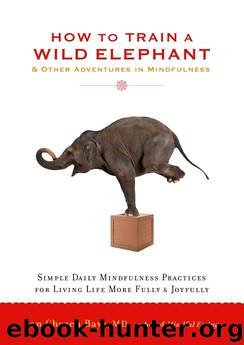How to Train a Wild Elephant by Jan Chozen Bays

Author:Jan Chozen Bays
Language: eng
Format: epub, mobi
Publisher: For the Benefit of Mr. Kite
Published: 2011-01-01T05:00:00+00:00
Final words
When you are unhappy, discover what you are clinging to and let it go.
26
Study Suffering
The Exercise
As you go about your day, pay attention to the phenomenon of suffering. How do you detect it in yourself or in others? Where is it most obvious? What are the milder forms? What are the more intense forms?
Reminding yourself
Post notes that say “Study Suffering,” or photos of an unhappy person, in appropriate places.
Discoveries
Suffering is everywhere. We see it in people’s anxious faces, hear it in their voices, see it on the news. As we study suffering, we can hear it in our own thoughts, feel it in our own bodies, see it in the face in the mirror. Often people begin this exercise thinking of suffering in its extreme and obvious forms, the death of someone you love, or children who are victims of war. As this task brings increased awareness, people discover that there is a spectrum of suffering, from mild irritation and impatience to rage or overwhelming grief.
We are exposed to the suffering not just of people but of animals as well. We see the suffering of those we love and also the suffering of strangers on the street. Suffering pours into our hearts and minds through the radio, TV, and Internet.
There is a difference between pain and suffering. Pain is the unpleasant physical sensations experienced by all human bodies, indeed all sentient beings. Suffering is the mental and emotional distress that is added to these physical sensations. The Buddha studied suffering meticulously for seven years and discovered that physical pain is inevitable, but the suffering added by the mind is optional. Actually, it is only optional if you have good tools to work with the mind and if you apply them diligently.
For example, when we have a headache, we can think, “OK, I have temporary discomfort in this area of the body.” Or we can think,
“This is the second headache I’ve had this week.” [Dragging the past into the present.]
“I’m sure it’s going to get worse, like it did before.” [Predicting and perhaps creating future events.]
“I can’t stand it.” [But, in actuality, you have before and you will again.]
“What’s wrong with me?” [Nothing. You are a humaning with a body.]
“Could I have a brain tumor?” [Extremely unlikely, but you can give yourself a much worse headache worrying about it.]
“Maybe it’s the stress I’m under at work. My boss is impossible…” [Coasting around for someone to blame.]
Does our mental distress help cure the physical pain? No, it only makes it stronger and prolongs it. We have taken simple temporary physical discomfort and turned it into a mass of suffering.
Download
How to Train a Wild Elephant by Jan Chozen Bays.mobi
This site does not store any files on its server. We only index and link to content provided by other sites. Please contact the content providers to delete copyright contents if any and email us, we'll remove relevant links or contents immediately.
Happiness by Matthieu Ricard(3047)
How to Stop Worrying and Start Living by Dale Carnegie(2722)
Getting Things Done by David Allen(2699)
The Chimp Paradox by Peters Dr Steve(2386)
What I Need by J. Daniels(2081)
The Empath's Survival Guide by Judith Orloff(2063)
The Finnish Way by Katja Pantzar(2001)
The Smartest Kids in the World by Amanda Ripley(1856)
Jealousy by Osho(1752)
Everything in Its Place by Dan Charnas(1743)
The Joy of Hygge by Jonny Jackson(1742)
Who Moved My Cheese?: An Amazing Way to Deal With Change in Your Work and in Your Life by Johnson Spencer(1648)
Free Yourself from Fears by Joseph O'Connor(1646)
Don't Sweat the Small Stuff at Work by Richard Carlson(1561)
Think Happy to Stay Happy by Becca Anderson(1517)
How to Build Self-Discipline to Exercise by Martin Meadows(1508)
Coping with Anxiety by Edmund Bourne & Lorna Garano(1508)
The Secret History of Freemasonry by Paul Naudon(1502)
Expectation by Anna Hope(1472)
